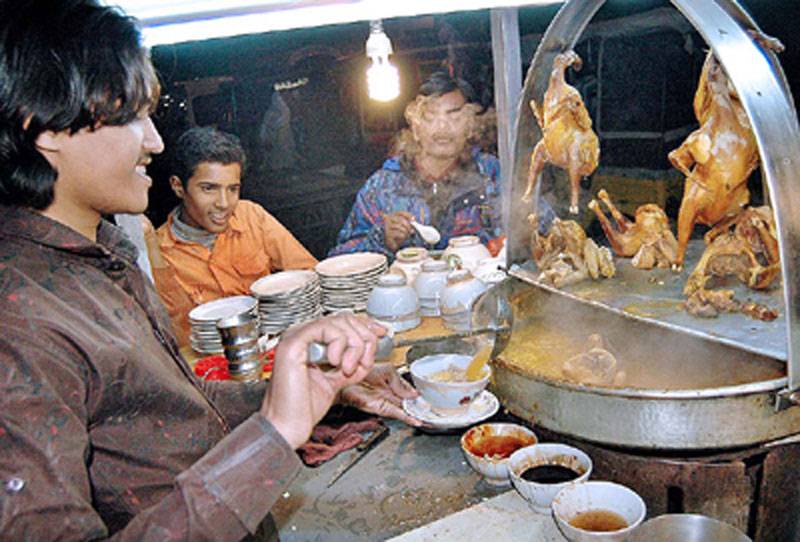Islamabad - Winter foods’ sale is on the rise in twin cities of Islamabad and Rawalpindi as the mercury going down sharply. The people are enjoying the traditional local winter foods like Doodh Jalebi, Gajar ka Halwa, chicken corn soup, Kashmiri tea, fried
fish and coffee etc.
Several markets including Melody market, Karachi Company, Jinnah Super, Super, Aabpara, F-10 Markaz, Commercial Market, Saddar, Raja Bazaar and other places are witnessing stalls of winter delights and are doing good business due to high demand. A winter food seller at Sitara market told APP that Doodh Jalebi (a sweetmeat soaked in milk) was high in demand these days, adding that he prepared three large utensils of Doodh Jalebi on daily basis and it all sell like hot cakes.
Gajar ka Halwa also, is considered to be one of irresistible food items in the winter. Prepared with carrots, condensed milk and dry fruits, the delicious dessert is not only a source of energy, but also adds colour and taste to the meal. Besides, fried food like pakoras, samosas and vegetable rolls are also high in demand now these days. Chicken corn soup is the most favorite and widely liked soup for the customers especially in twin cities. A vendor said that fish consumption multiplied in winter, which was evident from a surge in its sale during the cold weather.
In addition to regular fish shops, mobile fish vendors roaming around with their ware on bicycles and hand- pushed carts are a common sight these days, and usually they offer a good price margin.
Kashmiri tea is another most favorite winter hot drink and it looks more delicious, serve with crushed almonds and pistachio.
Meanwhile, the extremely cold weather has multiplied the demand of chicken and as a result its prices have registered a sharp increase during the last week in twin cities of Islamabad and Rawalpindi.
Normally in winter season, the use of poultry products increase which ultimately result in escalating prices.
But, according to market sources, the priceso of two essential commodities including chicken and eggs have increased from Rs150 per kilogram to Rs180 kilogram and Rs115 per dozen to Rs125 per dozen respectively.
The chicken is being sold up to Rs18 per kilogram, eggs up to Rs125 per dozen in the different markets of the twin cities which is not affordable price for a common man. A couple of a week ago, the chicken prices was around Rs150 per kg and eggs Rs115 per dozen but despite the decrease in the prices of petroleum products, the poultry prices are going up.
Most of the people use eggs in their daily breakfast as it contains sufficient proteins which help maintaining good health but now they have to go for an alternative energy intake source.
Imran Ahmad, an employee of a private office said that the demand of eggs usually increases in the winter season and subsequently the prices shoot up.
Eggs are an absolute priority in breakfast and people are forced to purchase them on high prices. A student, Waqas Majeed said it never happened in the past that the prices of eatables shoot up to this extent.
The concerned authorities should chalk out a mechanism to control prices of kitchen items especially chicken and eggs which are essential for a sound health, Sadia Sajjad, a house wife, suggested.
When contacted, a representative of the Poultry Association held costly feed, rise in electricity prices responsible for increasing prices of the poultry products.
He claimed that despite cut in fuel prices, the transporters have not cut down transportation charges.
Friday, April 19, 2024
Winter foods sale on rise

Formula 1 returns to China for Round 5
9:05 PM | April 19, 2024
Germany head coach Julian Nagelsmann extends contract till 2026 World Cup
9:00 PM | April 19, 2024
IMF urges Italy, France to spend less, Germany to loosen purse strings
8:57 PM | April 19, 2024
PM calls UAE president, admires Emirati leadership's response to recent Dubai rains
8:55 PM | April 19, 2024
Church leader calls for including Christians in Gandhara Corridor
8:50 PM | April 19, 2024
A Tense Neighbourhood
April 19, 2024
Dubai Underwater
April 19, 2024
X Debate Continues
April 19, 2024
Hepatitis Challenge
April 18, 2024
IMF Predictions
April 18, 2024
Kite tragedy
April 19, 2024
Discipline dilemma
April 19, 2024
Urgent plea
April 19, 2024
Justice denied
April 18, 2024
AI dilemmas unveiled
April 18, 2024
ePaper - Nawaiwaqt
Advertisement
Nawaiwaqt Group | Copyright © 2024





